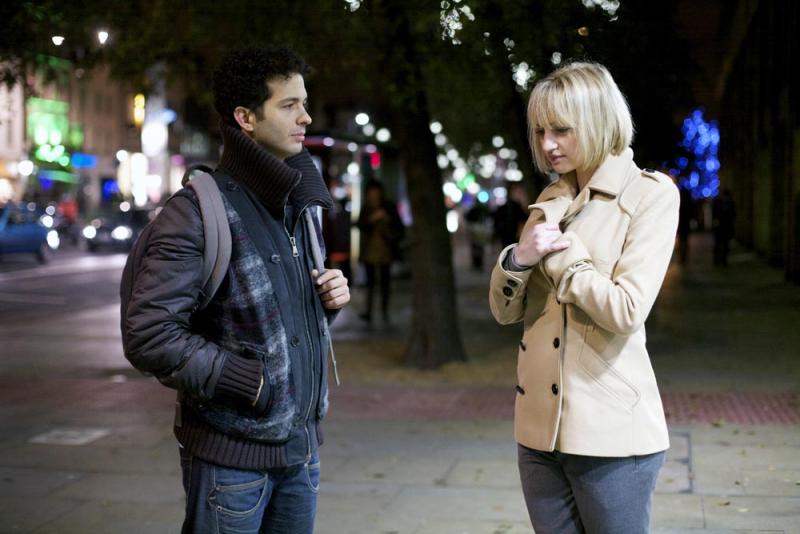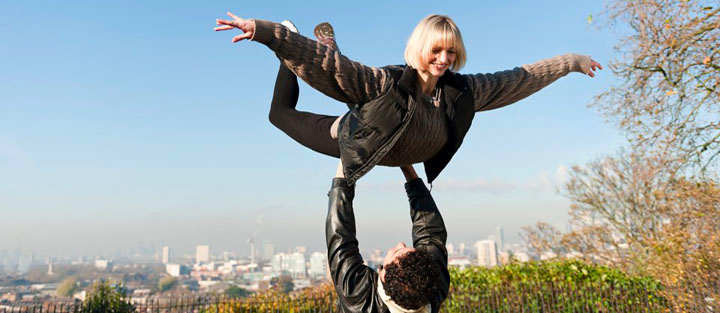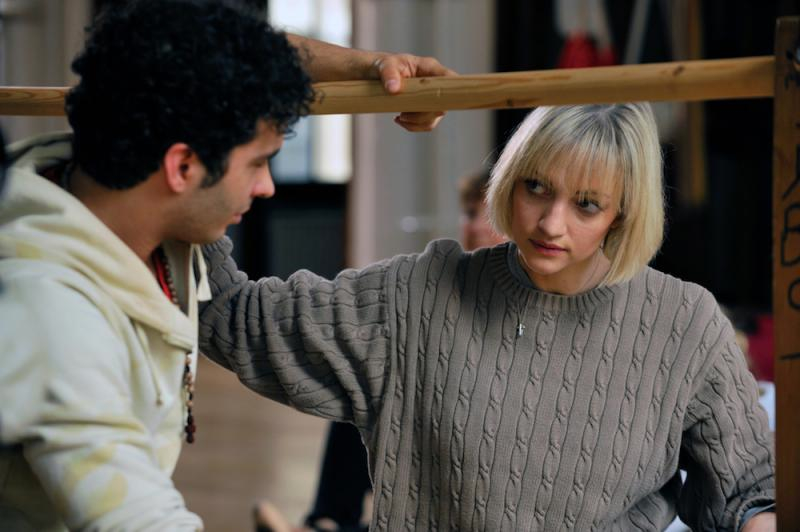Love Tomorrow | reviews, news & interviews
Love Tomorrow
Love Tomorrow
The antidote to Black Swan - a dance story that makes the right moves

Feature films about ballet are rarities - are the memorable ones those that are realistic about their strenuous world or are they the expressionistic shockers that let rip with the red eyes and OTT fantasies? Black Swan became an instant world hit on the strength of its purple take on showbiz (never mind it was packaged in a ballet scenario, this was more a riproaring horror story). Love Tomorrow is altogether something else.
Scraping around the hidden freelance dance world of London, neither of them is employed at the moment. One has had her hopes broken by injury, the other by the natural transience of existence for the itinerant young dancer for hire. Oriel, a mercurial Cuban lothario, has a great brush-off line: “My visa expires in two weeks, so I probably won’t see you again.” Delivered with a rueful twinkle, it captures the allure of a life where people are constantly in transit, in their imaginations and in reality, forming professional intimacies unique to dancing, but on which not too many personal stakes should be placed.
 The risk looks considerable in casting two ballet dancers in the leading roles, rather than actors who dance: for this is not an orthodox love story but one where both Oriel and Eva have arresting secrets to keep. They meet in passing on the London tube escalator, he swarthy and twinklingly on the make, she ash-blonde, with a shuttered face. The story blooms into what appears to be a predictable romance, sun melting ice, but then takes a sudden and thought-provoking turn, which makes a large new set of demands of the leading performers where their skills at evocative body language leap to the fore.
The risk looks considerable in casting two ballet dancers in the leading roles, rather than actors who dance: for this is not an orthodox love story but one where both Oriel and Eva have arresting secrets to keep. They meet in passing on the London tube escalator, he swarthy and twinklingly on the make, she ash-blonde, with a shuttered face. The story blooms into what appears to be a predictable romance, sun melting ice, but then takes a sudden and thought-provoking turn, which makes a large new set of demands of the leading performers where their skills at evocative body language leap to the fore.
Ash-blonde Cindy Jourdain danced until 2010 with the Royal Ballet and English National Ballet. She was a notably impressive actress among dancers (dance-goers might recall her heartbreaking Empress Elizabeth in Mayerling), and here her face, pale as snow, seems loaded with bones and shadows, huge eyes dark with perpetual sorrow as the camera almost intrusively closes in, seeking to find in her reticent expressions what that chilling grief is.
More surprising to me was how excellent Arionel Vargas is as Oriel. A fairly impassive performer on stage at English National Ballet, in this film he’s transformed himself into an extremely attractive male, sunny, flighty and non-stick, but probably a good ’un deep down. (The character's name echoes Ariel, a spirit messenger in a sense.) His thick Cuban accent comes across as part of the attraction, neatly mixed into scenes of London’s populous Hispanic ballet community, and believable plot subtexts enrich his character - the visa issue is real, he keeps photos of children, wives, liaisons and responsibilities left incomplete but still lingering on his conscience, and he’s 30, a worrying age for a dancer.
 That they are dancers is important: the dance world is a secret one full of mysteries for the outsider, about the inside career ladder, psychology and ghosts. Oriel is, surprisingly, a follower of Cuban Yoruba religion, who beats off the bad spirits from a failed audition by swiftly stacking up a little shrine in the street outside. Vargas’ truthfulness as an actor and director Christopher Payne’s inventiveness come together to bring this unorthodox little incident off as part of the whole picture.
That they are dancers is important: the dance world is a secret one full of mysteries for the outsider, about the inside career ladder, psychology and ghosts. Oriel is, surprisingly, a follower of Cuban Yoruba religion, who beats off the bad spirits from a failed audition by swiftly stacking up a little shrine in the street outside. Vargas’ truthfulness as an actor and director Christopher Payne’s inventiveness come together to bring this unorthodox little incident off as part of the whole picture.
But there’s quite a bit of bravery lurking in this picture, which won last year's Raindance Festival Best UK Feature award. The dialogue, kept minimal to spare the dancers’ skills, is taken at rather too careful a pace but the compensation is the vivid way movement is woven into expressing their personalities. Oriel breaks heedlessly into a ballet solo in an underpass; Eva, immobile, watches him with an inscrutably sad face. The two of them watch yearningly from the Sadler’s Wells wings at a ballet performance, ecstatically and briefly filmed by the Ballet Boyz, who were also responsible for the lovely meeting in the park, where the two improvise a ballet pas de deux like children playing dares among the autumn leaves. These three sequences have a shimmering otherworldliness, a powerful whiff of the lure of dance to liberate the soul and the difficulties encountered to achieve that illusion.
Shot fast and economically, the director's eye finds fine detail in the day-to-day London of a dancer’s life: inside, the famous Sadler's Wells stage bathed in celestial lights, outside, a bus stop in the rain - outside, the impassive green glass of the fabulous Laban Centre, inside, the plainness of a studio where a bitchy choreographer plays favourites. That's one role that needs a proper actor: the brilliant Samuel Barnett, Twenty Twelve's insinuating PA among other fine things on his CV.
The end of the film has a poignant rasp, as Eva longs for Oriel to kiss her, amid the ripples of their now-discovered circumstances. You very much want to know what happened next, the mark of a good character film, truly delivered.
- Love Tomorrow website - the film is on general release from 8 November and on DVD from 2 December
- Arionel Vargas dances in English National Ballet's Le Corsaire, currently on tour in the UK
Overleaf: watch the trailer to Love Tomorrow
The future of Arts Journalism
You can stop theartsdesk.com closing!
We urgently need financing to survive. Our fundraising drive has thus far raised £49,000 but we need to reach £100,000 or we will be forced to close. Please contribute here: https://gofund.me/c3f6033d
And if you can forward this information to anyone who might assist, we’d be grateful.

Subscribe to theartsdesk.com
Thank you for continuing to read our work on theartsdesk.com. For unlimited access to every article in its entirety, including our archive of more than 15,000 pieces, we're asking for £5 per month or £40 per year. We feel it's a very good deal, and hope you do too.
To take a subscription now simply click here.
And if you're looking for that extra gift for a friend or family member, why not treat them to a theartsdesk.com gift subscription?
more Film
 After the Hunt review - muddled #MeToo provocation
Julia Roberts excels despite misfiring drama
After the Hunt review - muddled #MeToo provocation
Julia Roberts excels despite misfiring drama
 London Film Festival 2025 - Bradley Cooper channels John Bishop, the Boss goes to Nebraska, and a French pandemic
... not to mention Kristen Stewart's directing debut and a punchy prison drama
London Film Festival 2025 - Bradley Cooper channels John Bishop, the Boss goes to Nebraska, and a French pandemic
... not to mention Kristen Stewart's directing debut and a punchy prison drama
 Ballad of a Small Player review - Colin Farrell's all in as a gambler down on his luck
Conclave director Edward Berger swaps the Vatican for Asia's sin city
Ballad of a Small Player review - Colin Farrell's all in as a gambler down on his luck
Conclave director Edward Berger swaps the Vatican for Asia's sin city
 London Film Festival - from paranoia in Brazil and Iran, to light relief in New York and Tuscany
'Jay Kelly' disappoints, 'It Was Just an Accident' doesn't
London Film Festival - from paranoia in Brazil and Iran, to light relief in New York and Tuscany
'Jay Kelly' disappoints, 'It Was Just an Accident' doesn't
 Iron Ladies review - working-class heroines of the Miners' Strike
Documentary salutes the staunch women who fought Thatcher's pit closures
Iron Ladies review - working-class heroines of the Miners' Strike
Documentary salutes the staunch women who fought Thatcher's pit closures
 Blu-ray: The Man in the White Suit
Ealing Studios' prescient black comedy, as sharp as ever
Blu-ray: The Man in the White Suit
Ealing Studios' prescient black comedy, as sharp as ever
 The Woman in Cabin 10 review - Scandi noir meets Agatha Christie on a superyacht
Reason goes overboard on a seagoing mystery thriller
The Woman in Cabin 10 review - Scandi noir meets Agatha Christie on a superyacht
Reason goes overboard on a seagoing mystery thriller
 London Film Festival 2025 - crime, punishment, pop stars and shrinks
Daniel Craig investigates, Jodie Foster speaks French and Colin Farrell has a gambling habit
London Film Festival 2025 - crime, punishment, pop stars and shrinks
Daniel Craig investigates, Jodie Foster speaks French and Colin Farrell has a gambling habit
 I Swear review - taking stock of Tourette's
A sharp and moving tale of cuss-words and tics
I Swear review - taking stock of Tourette's
A sharp and moving tale of cuss-words and tics
 A House of Dynamite review - the final countdown
Kathryn Bigelow's cautionary tale sets the nuclear clock ticking again
A House of Dynamite review - the final countdown
Kathryn Bigelow's cautionary tale sets the nuclear clock ticking again
 theartsdesk Q&A: Idris Elba on playing a US President faced with a missile crisis in 'A House of Dynamite'
The star talks about Presidential decision-making when millions of lives are imperilled
theartsdesk Q&A: Idris Elba on playing a US President faced with a missile crisis in 'A House of Dynamite'
The star talks about Presidential decision-making when millions of lives are imperilled

Add comment